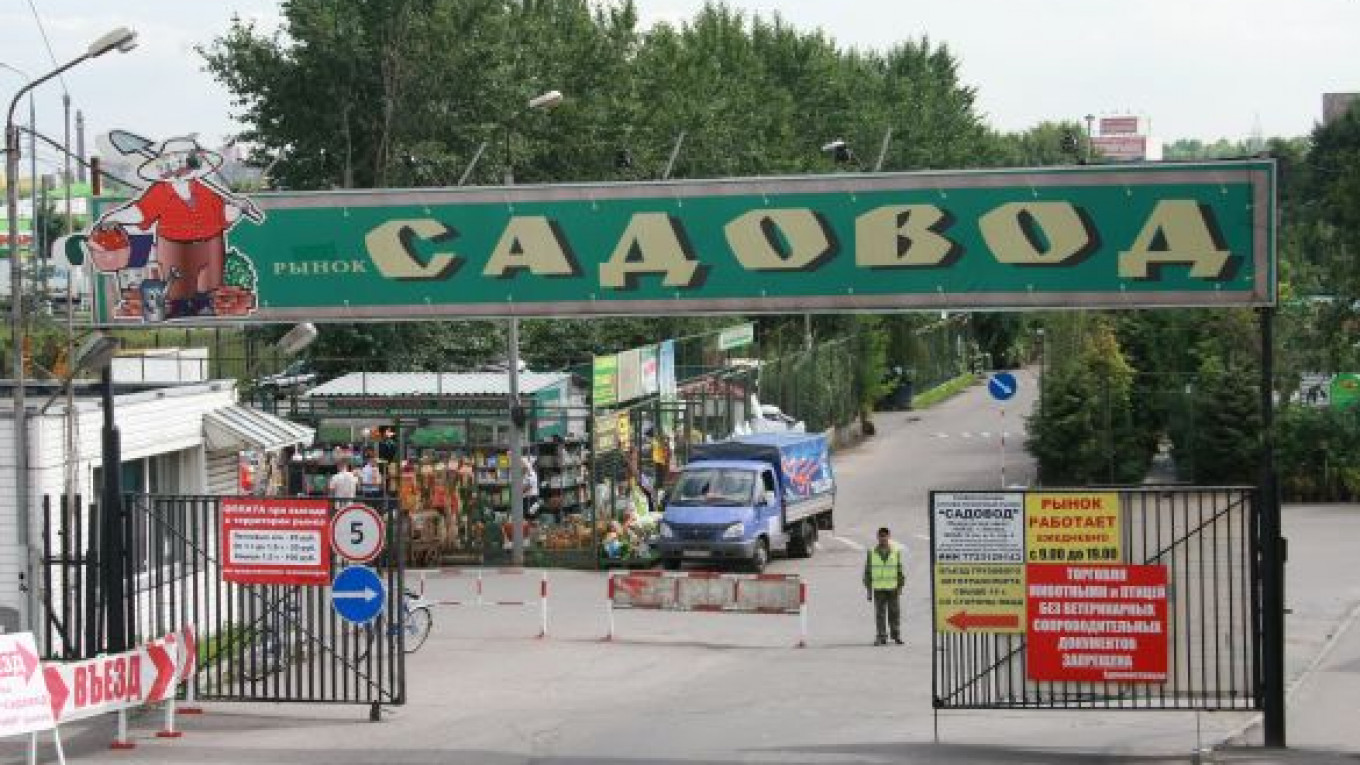Police on Monday raided the sprawling Sadovod street market on the southeastern outskirts of Moscow, detaining about 1,000 migrants from former Soviet countries and an unknown amount of suspected counterfeit merchandise.
The raid was part of official inspections of the city's street markets and other areas with heavy concentrations of migrants that started in early August on the heels of an attack on a police officer by a Dagestani native at the Matveyevsky market in late July. The inspections coincided with a mayoral election campaign that heavily exploited anti-immigration sentiment.
The raids received a new impetus after thousands of people rioted in the Biryulyovo neighborhood in southern Moscow earlier this month to protest the killing of a resident that they blamed on an Azeri native working at a local market.
About 1,000 nationals of Kyrgyzstan, Tajikistan and Uzbekistan were detained at Sadovod on Monday to be checked for involvement in crimes and violations of migration law, city police spokesman Marat Bugulov told journalists, Interfax reported.
During the raid, the police also confiscated a large amount of merchandise that they suspected to be counterfeit, as well as an air pistol, bats and other weapons, Bugulov said.
"Such operations are carried out by employees of the Moscow police department regularly as part of efforts to decriminalize the capital's markets," Bugulov said.
The police conducted a security check as well, examining intercity buses that park at the market for explosives, without finding any. The checks were apparently prompted by a suicide bomber's attack on a bus in Volgograd on Oct. 21 that killed seven people and injured 33, as the bomber had originally been traveling from the Dagestani capital of Makhachkala to the Sadovod market.
Monday's raid at Sadovod was the second such inspection at the market in the last three months. During an inspection in early August, police detained more than 1,000 people.
Sadovod was opened in the mid-1990s under former Mayor Yury Luzhkov for selling merchandise for gardeners, but has since expanded and now also features pets, construction materials, clothes, carpets and textiles. It occupies an area of more than 38 hectares near the Moscow Ring Road.
But while officially the authorities are fighting illegal migration, certain groups in the government may be using the latest market raids to "redistribute property" or "get a new car or dacha," in exchange for turning a blind eye to violations, said Andrei Tumanov, a State Duma deputy with A Just Russia and head of the Sadovody Rossii, or Gardeners of Russia, association.
Sadovod is located in an area known as "golden land" because of high land prices, Tumanov said.
But Nadezhda Spiridonova, a spokeswoman for the billionaire co-owners of the market, God Nisanov and Zarakh Iliyev, denied the possibility of a commercial conflict.
"We do not think so," she said.
According to Vedomosti, the market's co-owners Nisanov and Iliyev also controlled Moscow's Cherkizovsky market, which was shut down in 2009 over counterfeit produce and migration violations.
The two businessmen now co-own the Moskva market in the Moscow district of Lyublino and several popular shopping malls in the city, including Yevropeysky near the Kiyevskaya metro station, the Grand furniture store, and a mall in the Moskva City business district. They also own the Radisson Royal Hotel and Radisson SAS Slavyanskaya, Vedomosti reported.
Another co-owner of the Sadovod market, Ilgam Ragimov, is a close associate of President Vladimir Putin, according to Forbes.
Contact the author at n.krainova@imedia.ru
A Message from The Moscow Times:
Dear readers,
We are facing unprecedented challenges. Russia's Prosecutor General's Office has designated The Moscow Times as an "undesirable" organization, criminalizing our work and putting our staff at risk of prosecution. This follows our earlier unjust labeling as a "foreign agent."
These actions are direct attempts to silence independent journalism in Russia. The authorities claim our work "discredits the decisions of the Russian leadership." We see things differently: we strive to provide accurate, unbiased reporting on Russia.
We, the journalists of The Moscow Times, refuse to be silenced. But to continue our work, we need your help.
Your support, no matter how small, makes a world of difference. If you can, please support us monthly starting from just $2. It's quick to set up, and every contribution makes a significant impact.
By supporting The Moscow Times, you're defending open, independent journalism in the face of repression. Thank you for standing with us.
Remind me later.






